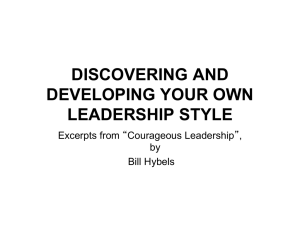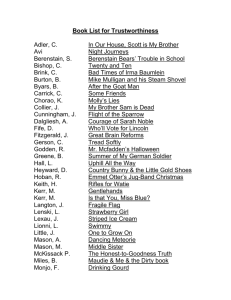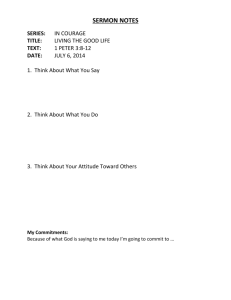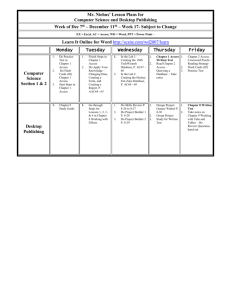4 Levels To Build Relationships
advertisement
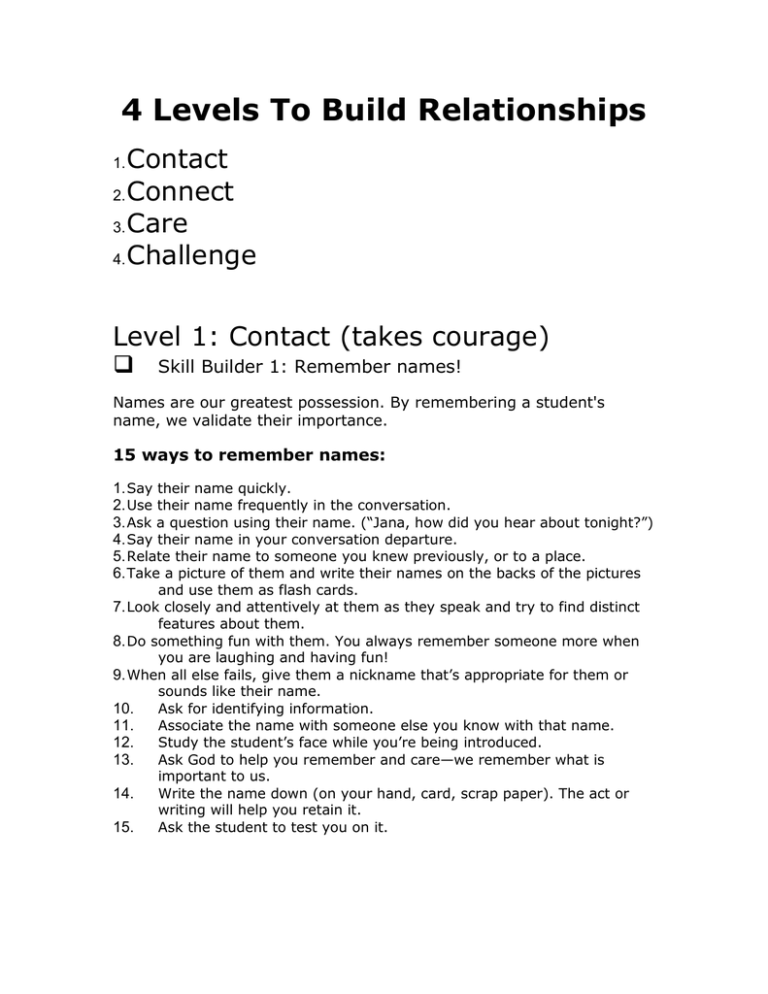
4 Levels To Build Relationships Contact 2. Connect 3. Care 4. Challenge 1. Level 1: Contact (takes courage) Skill Builder 1: Remember names! Names are our greatest possession. By remembering a student's name, we validate their importance. 15 ways to remember names: 1. Say their name quickly. 2. Use their name frequently in the conversation. 3. Ask a question using their name. (“Jana, how did you hear about tonight?”) 4. Say their name in your conversation departure. 5. Relate their name to someone you knew previously, or to a place. 6. Take a picture of them and write their names on the backs of the pictures and use them as flash cards. 7. Look closely and attentively at them as they speak and try to find distinct features about them. 8. Do something fun with them. You always remember someone more when you are laughing and having fun! 9. When all else fails, give them a nickname that’s appropriate for them or sounds like their name. 10. Ask for identifying information. 11. Associate the name with someone else you know with that name. 12. Study the student’s face while you’re being introduced. 13. Ask God to help you remember and care—we remember what is important to us. 14. Write the name down (on your hand, card, scrap paper). The act or writing will help you retain it. 15. Ask the student to test you on it. Skill Builder 2: Casual Conversation. Random Conversations with students about any subject they're comfortable with. 1. Life stages: talk about things that are specifically relevant to a particular life stage of a student. (Seniors-graduation, Juniorsdrivers’ license, Lower classman-why haven’t you started using deodorant?) 2. Seasonal Events: topics that apply to nearly everyone at different times of the year. (Easter, Christmas, etc.) 3. Noticeables: haircut, braces, tattoos, injuries, etc. 4. Personal Interests and Hobbies: music, bands, school activities, books, school, social, etc. Skill Builder 3: Appropriate Touch-often taken for granted, but it is a fundamental building block to relationships. Especially key when greeting one another, when we leave each other, and especially in times of crisis or stress. Level 2: Connect (takes courage & time) Students look beyond our appearance for safety, support & pursuit. • Safety: Students want to connect with adults they feel safe with. • Support: Students want to connect with adults who encourage and affirm them-who can see past their present mistakes, failures, and immaturity to who they can be • Pursuit: adults who seek a relationship and aren't discouraged by rejection or resistance Skill Builder 1: Pay Attention. Notice demeanor and body language for signs they want or need attention. Skill Builder 2: Encouraging Words. Also, write a letter to students or have their parents write an encouraging letter to them. Skill Builder 3: Go Deeper. Pursue common ground. Share an experience. Go into their world. Skill Builder 4: Asking questions. Use questions to draw students out. Remember: Contact takes Courage. Connect takes Time and Courage. "The Road to Emmaus" Luke 24:13-35 or open-ended question strategy Jesus genius in this: He used open-ended questions to find out what was going on inside—not to get the right answer. 1. Walk with them. 2. Use questions to find out about them-not as a way of finding out what they know. 3. Care about them-not their answers. 4. Let them figure it out. Level 3: Care (takes courage, time and love) Skill Builder 1: Listening. We need to listen to their souls; Be okay with silence. Listening allow us to hear-focus on their eyes, body language, discomfort or depression. Use email/texting to connect between meetings Skill Builder 2: Awareness. Use listening and noticing skills to discern and focus in on what's happening in a student's life. Skill Builder 3: Presence. Be there in good times and in crisis. Visit students on their turf. Remember: Contact takes Courage. Connect takes Time and Courage. Care takes Love, Time and Courage. Level 4: Challenge (takes courage, time, love & wisdom) Skill Builder 1: Coaching-prepare students to work out their faith when we're absent. Phil. 2:12. “Therefore, my beloved, just as you have always obeyed me, not only in my presence, but much more now in my absence, work out your own salvation with fear and trembling; 13 for it is God who is at work in you, enabling you both to will and to work for his good pleasure.” • Assign mutual homework-learn together. • Read together-hit a Christian bookstore and let the students choose a book you work through together. • Take them with you-let them see you doing what you want them to do. Skill Builder 2: Transparency-let students see the real you. • Brokenness-let students (appropriately) see your struggles; weaknesses and difficulties. • Uniqueness-trust that what makes you different than others is much more important that trying to mimic others. • CORE VALUE: Uniqueness is better than sameness. Skill Builder 3: Friendship-be an adult friend to them. CORE VALUE: Slow is better than fast. Remember, relationships build slowly- one tiny step at a time. It's okay to take time to build the relationship. See John 15:15 15 I do not call you servantsd any longer, because the servante does not know what the master is doing; but I have called you friends, because I have made known to you everything that I have heard from my Father. Remember: Contact takes courage. Connect takes time & courage. Care takes love, time & courage. Challenge takes wisdom, love, time & courage.

